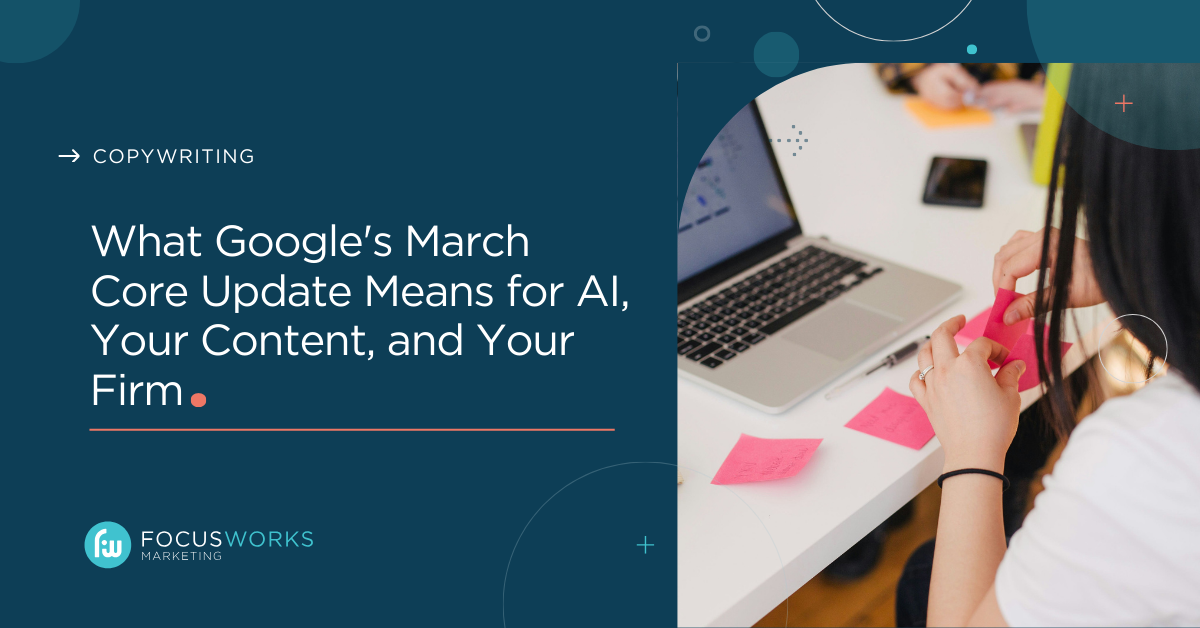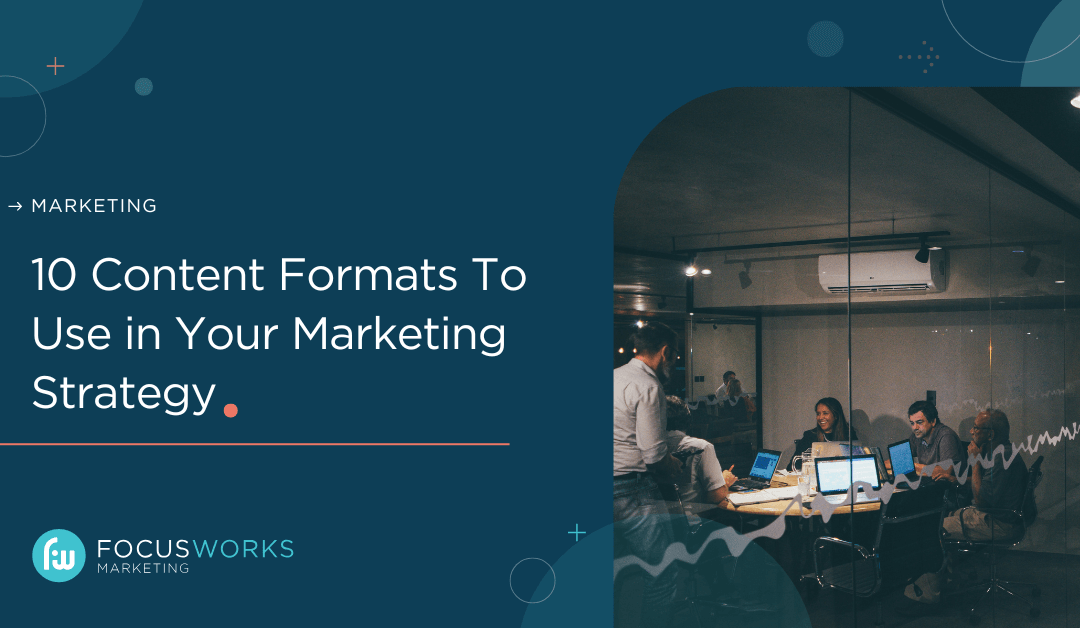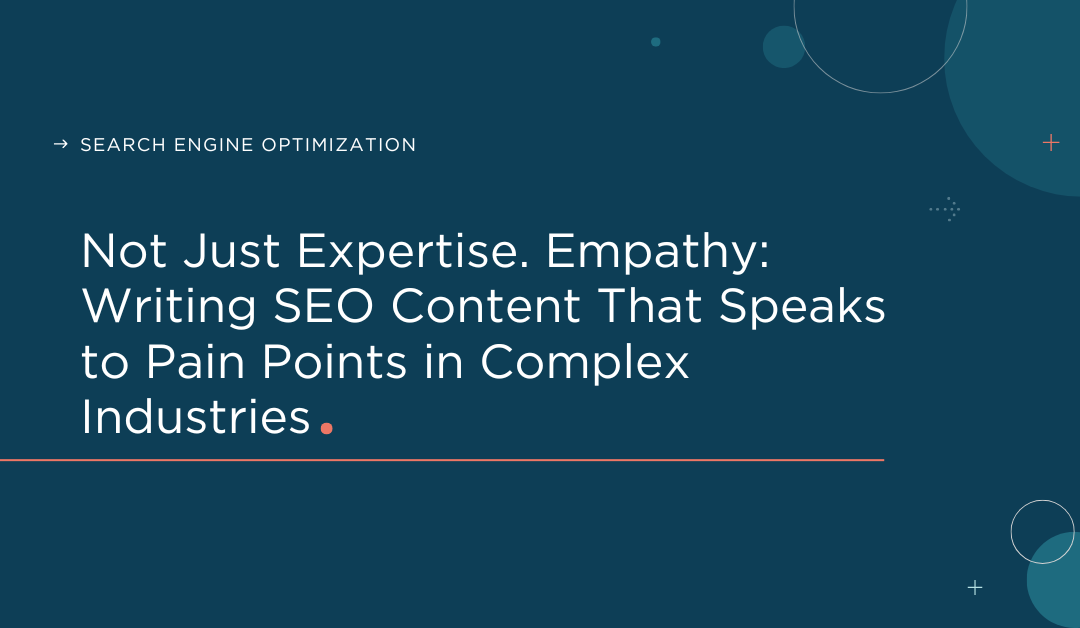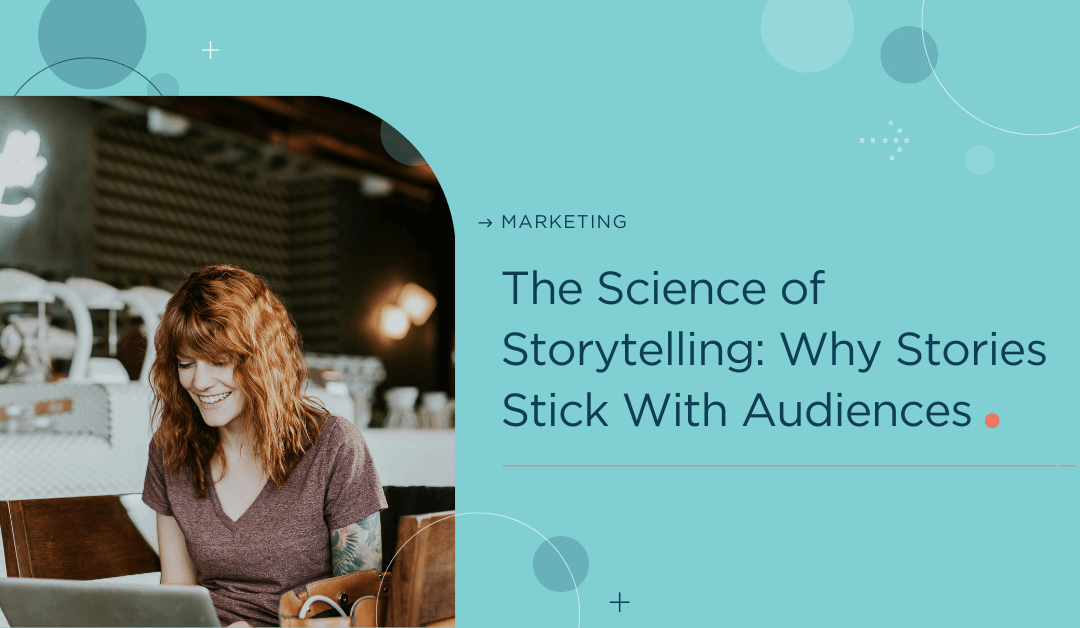When generative AI first exploded onto the scene—and indeed, it felt like an explosion—the internet became rife with articles, books, and videos promising that AI content creation would make your life easier and your business more profitable than ever before.
Who doesn’t love a big promise?
At first glance, generative AI seemed like a slam dunk for many law firms. The tools out there promise to save you considerable time, something every lawyer could benefit from.
It’s an attractive idea—with this one magic tool, you’d spend more time writing your briefs and closing arguments, and less time worrying about blog posts and social media marketing.
Well, not so fast. Google’s March Core Update earlier this year had a lot to say about that. And the last nine months have kept us all on our toes.
Google’s March core update: addressing scaled content abuse and spam websites
Google has been tinkering with its algorithm since its early days, but they’ve increased in volume over the years. The impact of these updates has ranged from barely perceptible to hold-onto-your-SERP-rankings as Google tries to align search results with good user experience and relevant results.
Increasingly, though, Google has turned its algorithmic eye to E-E-A-T (Experience, Expertise, Authoritativeness, and Trustworthiness) factors in content, penalizing websites that deliver low-quality, low-value content.
Enter: the March Core Update.
Google’s March Core Update specifically focused on reducing the visibility of websites engaging in scaled content abuse. Scaled content abuse, also called scaled content creation, is the mass production of content to boost search ranking, regardless of whether that creation involves humans, AI, or both.
This content is characterized by being:
- Unhelpful
- Built primarily to match very specific search queries
- Created for search engines instead of people
Google has stated that the ultimate goal of this update is to reduce low-quality, unoriginal content in search results by 40% through either lowered rankings or entirely de-indexing.
What came after the March Core Update?
March was a big deal, but as those who live in SEO and content marketing land know—core updates happen a lot. The August and November 2024 Core Updates reinforced Google’s focus on high-quality, user-first content.
- August Core Update: Rewarded content with firsthand experience and genuine expertise, especially in “Your Money or Your Life” (YMYL) topics like legal advice.
- November Core Update: Prioritized genuinely helpful content while demoting material created solely to rank well in search results.
These updates didn’t explicitly target AI-generated content but indirectly addressed the trend by promoting authentic, value-driven material.
Adding to the mix, Google’s AI Overviews feature now generates concise summaries of web pages in search results. This means your content must be clear, compelling, and packed with expertise to stand out—both in overviews and full-page views.
The takeaway? Google isn’t anti-AI, but it is against low-quality, generic content. For law firms, creating content with depth, value, and user focus is more critical than ever.
What have Google’s Core Updates meant for law firms in 2024?
It’s not particularly useful to think in absolutes about marketing and SEO, but indulge this one for a minute:
If your law firm uses AI-generated content, then you may struggle with Google’s new algorithm parameter. If your content is generic, non-authoritative, and unhelpful, your site is less likely to rank well.
But here’s the thing: law firms frequently outsource their content to freelancers or marketing agencies. It’s a budget-smart move, considering the ultimate value of your billable hours. But by doing so, you could unwittingly end up with AI content. Unless your vendor is scrupulous about their AI practices, you could end up on the wrong side of these updates.
The good (great, even) news is that Google’s March update doesn’t have to tank your marketing strategy. Instead, it can give you a competitive advantage.
Four ways your law firm can take advantage of Google’s update
At its core, Google’s updates strive to deliver a good user experience. Creating helpful, valuable results has always been Google’s priority. If your content strategy always has this goal in mind, then you’ll be well-positioned to capitalize on Google’s changing algorithm.
- Work with vendors who understand the risks of AI
If your marketing isn’t handled in-house, now is the time to talk with your vendors. Ask them about how they use AI in their processes. Questions to ask include:
- How have the 2024 updates influenced your SEO and content strategies for clients?
- What measures do you take to prevent content from being flagged as spam or low quality?
- If you use AI tools, how do you balance its use with human oversight?
Will they give away their secret sauce? No! But they should be forthright about their agency’s position on AI and its relationship to content and Google’s algorithm.
- Limit the use of generative AI to the planning stages.
Generative AI models like ChatGPT can be a helpful tool in the content planning process. It’s a great tool to brainstorm ideas and provide a starting point when writer’s block just won’t let go.
But if you’ve ever tried to create a blog post with a generative AI program, you may have noticed that it’s just….not great. And now with Google’s core update, AI-generated blog posts will actually hurt your search engine rankings.
Instead, keep your use of AI to the planning stages. You can use it to:
- Identify trends in your practice areas
- Generate topic ideas for blogs, downloadables, or practice area pages
- Build content clusters to support SEO goals
- Summarize or highlight key points during the research phase
- Build a marketing plan that protects your law firm and your clients.
AI models aren’t always accurate. They pull data from the internet—and there’s plenty of misleading or inaccurate information out there. When AI models generate content, there is always the chance that it will create inaccurate legal content.
For law firms, this can be a huge ethical issue. Providing inaccurate legal information on your website or social media platform can have a serious and detrimental impact on people’s lives. It can put your reputation in jeopardy and open your practice up to significant liability.
Another consideration is that Google takes legal content seriously. Legal information is considered one of the “Your Money Your Life” (YMYL) topics, which are those that can impact the health, safety, financial stability, or well-being of a reader. If Google doesn’t think your site delivers on the E-E-A-T factors (remember, above?), it could jeopardize your search rankings.
To safeguard against this, focus on providing value. If you work with a content vendor, prioritize those with experience in legal marketing and make sure you have clear editorial practices in place to ensure the accuracy of information.
- When in doubt, focus on custom content that provides real value.
Storytelling is a key component of how humans relate to each other and build shared experiences. It shows that you understand your audience. You know their pain points. You’ve taken the time to create solutions for their needs, and your product or service works because you understand their needs.
Generative AI just doesn’t do that.
No matter how digital our world becomes, we will always crave human connection. An AI algorithm, no matter how much of the internet it scans, can’t provide real connection (or, let’s face it, great legal advice).
For digital marketing, the ability to create a real, human connection is essential to standing out in the crowd. That’s always been the case. Now, with Google’s update, it applies more than ever.
Put content best practices at the core of your marketing strategy
Google’s core updates are reshaping digital marketing. The days of relying on generic, one-size-fits-all content and SEO won’t serve to improve your online profile or (more importantly) bring in clients.
If you want to stay competitive, it’s time to build a content strategy that puts authenticity and value first.
At FocusWorks Marketing, we specialize in creating content that aligns with Google’s latest updates and connects with your audience in a meaningful way. Whether you need a full-scale strategy overhaul or just a partner who can help you dial in your existing content, let’s talk.



